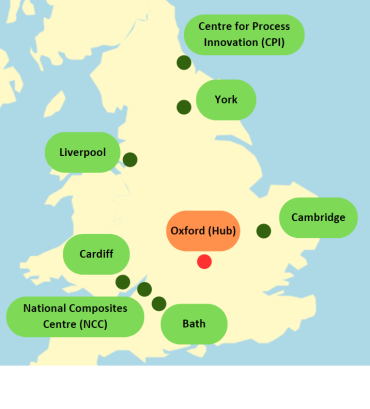
University of Oxford to lead new Sustainable Chemicals and Materials Manufacturing Research Hub
The University of Oxford is leading a major UK government investment in research to improve the sustainability of chemical and polymer production. The Sustainable Chemicals and Materials Manufacturing Hub (SCHEMA) will bring together researchers from across the UK working with a large consortium of commercial, technology translation and civic partners. The Hub has been funded by £11 million from the UKRI Engineering and Physical Sciences Research Council (EPSRC) and leverages a further £22 million in funding from its partners.
Supply chain partnerships are at the heart of SCHEMA. Our success will also rely on strong advocacy and engagement. Our prior success working with major national and international bodies will be used to support joined-up policy, legislative, and economic environments for the technologies developed in SCHEMA.
Professor Charlotte Williams, Department of Chemistry, University of Oxford.
SCHEMA is one of five new manufacturing research hubs announced today by UKRI EPSRC which aim to address a wide range of challenges in commercialising early-stage research within different manufacturing sectors.
Science Minister, Andrew Griffith said: 'Manufacturing accounts for almost a tenth of the UK’s economic output, but for the sector to keep growing and sustaining jobs nationwide, it has to tackle challenges ranging from reducing emissions, to cutting production costs. These new hubs will support UK researchers with the cutting-edge facilities they need, to help our manufacturers seize the benefits of technologies such as robotics and AI. Harnessing these innovations will cement the UK's position as a global leader in sustainable manufacturing.'
The SCHEMA Hub will be led by Professor Charlotte Williams OBE FRS from the University of Oxford’s Department of Chemistry, and will involve academics from Chemistry, Engineering, Materials Science, Computation, Environmental Economics, and Law at the Universities of Oxford, Bath, Liverpool, Cardiff, York and Cambridge.
Professor Williams said: ‘It is imperative that the chemical industry reaches net zero emissions and sustainability as so many essential downstream industries depend upon it. Our Hub will be well placed to tackle this difficult challenge by bringing together a very wide range of academic expertise with companies from across the supply chain.’
The research focusses on transforming the way chemicals and polymers are designed, made, and recycled. This includes supporting the transition away from the use of virgin petrochemicals and redesigning processes and materials to increase recycling rates. A key focus will be to design processes that can produce chemicals and polymers from renewable raw materials such as biomass, carbon dioxide, and even industrial wastes, and integrating renewable energy into the process engineering. This will build upon the University Oxford’s research on transforming carbon dioxide and biomass wastes into plastics, elastics, adhesives, and coatings.
 Map showing the regional spread of institutes involved in SCHEMA.
Map showing the regional spread of institutes involved in SCHEMA. Within SCHEMA, researchers will work with a range of partners including businesses, catapults, professional societies, and international academic partners to tackle the shared materials design and sustainability challenges of important end-use sectors. These partnerships will enable sustainable chemicals and polymers to be designed for immediate use within key sectors including electronics, transportation, energy generation and storage, construction, and fast-moving consumer goods.
At launch, the team are supported by 25 companies from across the supply chain, representing polymer and material end-users.
The Hub seeks to ensure that the UK remains at the forefront of major international efforts to transition to sustainable chemical manufacturing. The research program will train a new generation of postdoctoral and early career researchers to take on leadership roles in UK sustainable chemical manufacturing.
Professor Charlotte Deane, EPSRC Executive Chair, and a Professor in Oxford University’s Department of Statistics, said: ‘Given the scale and importance of the UK’s manufacturing sector we must ensure that it is able to benefit fully from advances made across the research and innovation ecosystem. With their focus on innovation and sustainability the advances made by the hubs will benefit specific sectors, the wider manufacturing sector and economy, as well the environment.’
Finding new ways to sustainably make things is a challenge of our age. It is quite right that University plays its part. The SCHEMA Hub is a collaborative venture engaging academia, industry, and policymakers. The hub will rethink and reformulate chemical production, making it not just environmentally friendly, but an engine of innovation and progress for generations to come.
Professor Jim Naismith, Head of Mathematical, Physical and Life Sciences Division at the University of Oxford
Chemical manufacturing is crucial to the UK’s economy. It is the UK’s second largest manufacturing industry, directly employing over 140,000 people and delivering turnover exceeding £75 bn/yr. However, there is an urgent need for this industry to tackle the environmental impact from both manufacturing and its products. Greenhouse gas emissions from the global sector are significant, with it currently accounting for approximately 5–6% of emissions, which is 2–3 times larger than the global airline industry. Coupled to this are the challenges of raw material being sourced from fossil fuel extraction and refining, pollution in water and soil, and globally low rates of polymer recycling.
The academics working in SCHEMA have strong track records in commercial partnership and entrepreneurship. For example, Hub EDI champion Professor Kylie Vincent is a founder of HydRegen, which applies innovative chemo-enzymatic processes to make chemicals. The Hub is strongly integrated with high-tech and growth SMEs as well as multinationals. It builds upon the successful partnerships established in the Oxford and Bath-led Innovation Centre for Applied Sustainable Technologies.
For further information about the EPSRC SCHEMA Hub please contact Professor Charlotte Williams and Dr Greg Sulley.
 Expert Comment: Chatbot-driven sexual abuse? The Grok case is just the tip of the iceberg
Expert Comment: Chatbot-driven sexual abuse? The Grok case is just the tip of the iceberg
 New study finds that stopping weight-loss drugs is linked to faster regain than ending diet programmes
New study finds that stopping weight-loss drugs is linked to faster regain than ending diet programmes
 Oxford scientists launch ambitious roadmap for a circular carbon plastics economy
Oxford scientists launch ambitious roadmap for a circular carbon plastics economy
 Unlocking more sustainable futures with green chemistry
Unlocking more sustainable futures with green chemistry Award-winning HydRegen technology offers path to 'clean, safe' chemical production
Award-winning HydRegen technology offers path to 'clean, safe' chemical production